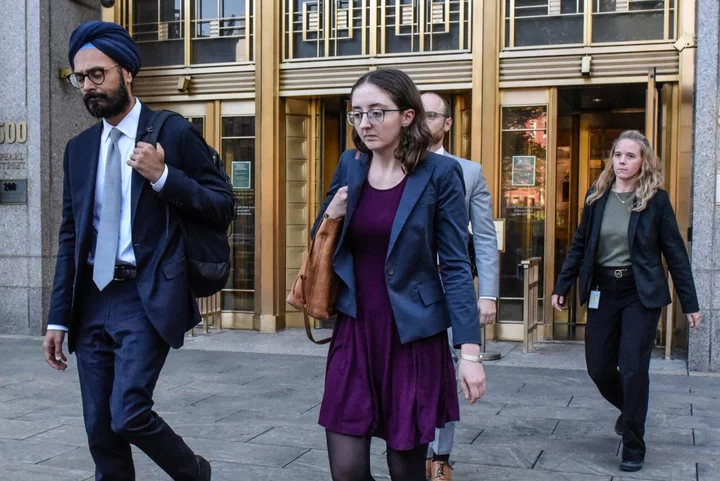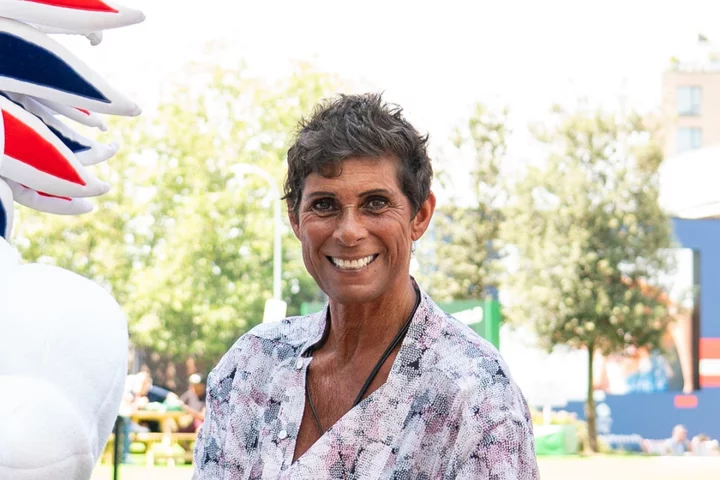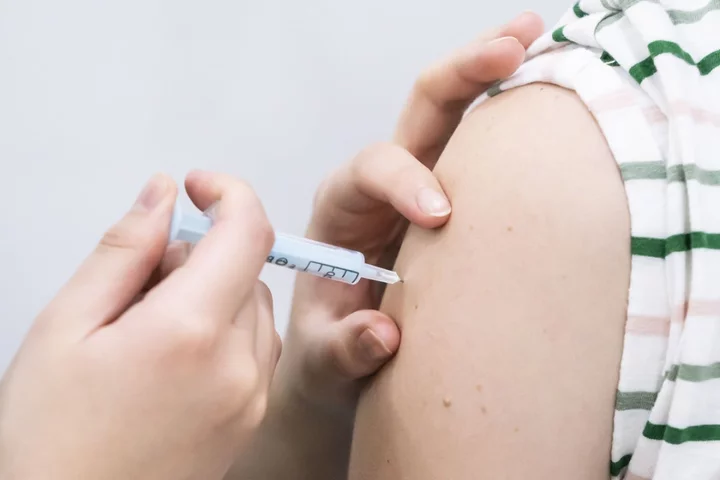
This middle-schooler 'knew how to be a best friend to everybody.' Then gunfire erupted while she was out to buy milk
It's been almost nine months since Brexi Torres-Ortiz and her mom sang together -- hitting every note, feeling every emotion with every word of a gospel tune that happened to be the 11-year-old's favorite song.
2023-10-26 18:58

Ukraine war: Russians likely targeted Khmelnytsky nuclear plant - Zelensky
The International Atomic Energy Agency said the plant's operations were unaffected.
2023-10-26 18:50

Aberdeen mother and young son die in Mumbai fire
Dr Glory Valthaty was understood to have been visiting relatives with her two children and husband.
2023-10-26 18:22

Factbox-Governments race to regulate AI tools
(Reuters) -Rapid advances in artificial intelligence (AI) such as Microsoft-backed OpenAI's ChatGPT are complicating governments' efforts to agree laws governing
2023-10-26 17:56

Nasdaq Futures Sink 1% as Earnings Disappoint: Markets Wrap
Stocks tumbled, with Nasdaq index futures losing about 1%, as investors punished companies reporting weaker-than-expected earnings. Meta Inc.
2023-10-26 17:49

Sam Bankman-Fried Testimony Is Trial Climax for FTX Court Watchers
Sam Bankman-Fried’s testimony in a New York courtroom Thursday will be the latest must-see moment in the high-profile
2023-10-26 17:45

A year after deadly South Korean crush, families fight for accountability
By Hyunsu Yim and Daewoung Kim SEOUL One year after Park Young-soo lost her only son in a
2023-10-26 16:57

Fatima Whitbread supporting new fostering campaign, as research finds ‘misconceptions put people off’
Misconceptions including being single or too old are said to be putting people off fostering at a time of dire need for more carers, as Olympian Fatima Whitbread and poet Lemn Sissay front a new recruitment campaign. Radio presenter Pandora Christie has also joined efforts to get more people to consider fostering, as the trio – who all had experience living in care as children – shared photographs of their younger selves in support of the campaign. The National Fostering Group (NFG), which describes itself as the largest network of independent fostering agencies in the UK, said its research had shown thousands of carers are needed across Great Britain. Sissay, who has previously detailed his experiences in the British care system, said fostering or adoption is “the greatest thing a human being can do for another”, while Whitbread, who grew up in children’s homes, said it is “a unique chance to make a real difference to a child’s life”. The NFG described the care system as being “at a critical point” and said information it had received from 128 local authority fostering agencies in England, Scotland and Wales suggested almost two thirds of those had seen a rise in young people going into care in the last 12 months and an estimated 10,500 foster carers are now “urgently needed across the country”. But its polling of 2,000 adults suggested less than a fifth (14%)of people would consider fostering – a figure the NFG said could be higher if certain misconceptions were not held. More than a third (34%) of people felt they were too old to foster – with most of those who said this in the 65-plus age bracket, but 18% aged between 55 and 64 and 11% aged 45 to 54, the NFG said. Other reasons included already having their own children (13%), being single (13%), working (11%) and being disabled (9%), it added. Steve Christie, chief executive of the NFG said: “Many people perceive there to be barriers to becoming a foster carer that simply aren’t true. “We will consider people regardless of age, marital status, gender, sexuality, disability or employment status. “Anyone who has room in their home and their heart could be a foster carer, and most of our foster carers say that fostering is the best thing they have ever done.” Backing the campaign, Olympic javelin champion Whitbread said: “Foster carers offer children and young people a safe, loving and nurturing home when they can’t live with their birth families. This means they have a unique chance to make a real difference to a child’s life.” Heart radio presenter Christie, who went into foster care aged nine, said: “Foster parents are fundamental in creating a safe home environment and support system for children and young people who find themselves needing care. “The amount of futures they help to change and the difference foster parents can make to a child’s life is indescribable.” Sissay, who wrote about his time in care in his autobiography, My Name Is Why, said: “A child will test you emotionally, spiritually, financially, throughout your life, so to foster or adopt a child is the greatest thing a human being can do for another.” For more information on fostering, visit www.nfa.co.uk. Read More 5 key coat trends to complete your autumn/winter wardrobe 12 ways to weave some woodland wonder into your home Hibernation mode: 5 small self-care adjustments to make before the clocks change 13 possible cancer symptoms you should get checked out Neglecting women’s health at work could cost UK economy £20.2bn a year – analysis Nearly three-quarters of mothers feel invisible, study suggests
2023-10-26 16:49

David Hunter: Appeal against Cyprus manslaughter verdict begins
David Hunter was convicted of the manslaughter of his ill wife but could be tried again for murder.
2023-10-26 16:49

Shingles symptoms, what causes it and how to treat the virus
Shingles can be a very painful experience that affects around one in four adults in their lifetime. The infection, also known as herpes zoster, is caused by the varicella-zoster virus which also causes chickenpox. The virus is extremely common, with more than 90 per cent of the world’s population having it. It is usually contracted when people get chickenpox as children, but the virus does not go away, instead, it will lay dormant in the body’s nervous system for years. For about a third of people who get the virus, it will reactivate some years later and cause shingles. Here is everything you need to know about the symptoms of shingles and how to treat it: What are the symptoms? A person who gets shingles will experience a painful rash that can occur anywhere on the body. Early signs of shingles could be a tingling or painful feeling in an area of skin, a headache or feeling generally unwell. According to the NHS, the rash usually looks like “a single stripe of blisters that wraps around the left side or right side of your torso”. They appear as blotches on the skin that become itchy blisters, which can break and ooze fluid. The rash can be red, but this can be harder to see on brown or black skin. The rash can also appear on your face, eyes and genitals. If it appears around your eyes, it can affect your sight or hearing and make it hard to move one side of your face. According to the Mayo Clinic, if left untreated, the infection can lead to permanent eye damage. After a few days, the blisters will dry out and become scabs. If a rash appears on both the left and right side of the body, it is unlikely to be shingles. How is it treated? Shingles can take up to four weeks to heal, but can have more severe consequences in older people above the age of 50. If the symptoms are not serious, patients can take paracetamol to ease the pain and use a cool compress on the rash several times a day to soothe it. It is also recommended that you keep the area with the rash clean and dry to reduce the risk of infection and wear loose-fitting clothing. But there are some situations in which it is recommended you contact your GP or call 111. Due to the heightened risk in older people, you should seek help if you are aged 50 or older. People with a weakened immune system should also contact the health service, as well as those who have a rash that is widespread and painful, or has appeared near an eye. Are shingles contagious? Shingles are not contagious and you cannot spread them. However, if you come into contact with someone who has not had chickenpox and has not been vaccinated against chickenpox, they could catch chickenpox from you. The NHS recommends you avoid being around pregnant people who have not had chickenpox before, people with a weakened immune system, and babies that are less than a month old. Is there a vaccine against shingles? Yes, but it is only available on the NHS to people in their 70s. Shingles can be fatal for around one in 1,000 over-70s who develop it. The vaccine injection only needs to be given once. However, some people who cannot have the routine vaccine for health reasons will need two doses. Getting the vaccine will reduce your risk of getting shingles, and if you do get it, your symptoms may be milder and the illness shorter. If you already had shingles, you can still get the vaccine to protect yourself against developing it again. You may have to wait up to one year after you have recovered from the illness before you can get the vaccine. Read More When do the clocks go back in the UK this year? Hibernation mode: 5 small self-care adjustments to make before the clocks change Want to be a useful man? Arnold Schwarzenegger is here to tell you how When do the clocks go back in the UK this year? Hibernation mode: 5 small self-care adjustments to make before the clocks change Want to be a useful man? Arnold Schwarzenegger is here to tell you how
2023-10-26 15:54

Shingles explained as Holly Willoughby takes time off from This Morning
Holly Willoughby has announced that she “may not” be c-hosting ITV’s This Morning in the coming week due to contracting shingles. The 42-year-old TV presenter wrote on her Instagram Story on Sunday (16 April): “Hi, just to let you know, I may be away for the rest of the week as I have shingles.” “I’ll be back as soon as I’m better. Huge love,” she added. Shingles can be a very painful experience that affects around one in four adults in their lifetime. The infection, also known as herpes zoster, is caused by the varicella-zoster virus which also causes chickenpox. The virus is extremely common, with more than 90 per cent of the world’s population having it. It is usually contracted when people get chickenpox as children, but the virus does not go away, instead, it will lay dormant in the body’s nervous system for years. For about a third of people who get the virus, it will reactivate some years later and cause shingles. Here is everything you need to know about the symptoms of shingles and how to treat it: What are the symptoms? A person who gets shingles will experience a painful rash that can occur anywhere on the body. Early signs of shingles could be a tingling or painful feeling in an area of skin, a headache or feeling generally unwell. According to the NHS, the rash usually looks like “a single stripe of blisters that wraps around the left side or right side of your torso”. They appear as blotches on the skin that become itchy blisters, which can break and ooze fluid. The rash can be red, but this can be harder to see on brown or black skin. The rash can also appear on your face, eyes and genitals. If it appears around your eyes, it can affect your sight or hearing and make it hard to move one side of your face. According to the Mayo Clinic, if left untreated, the infection can lead to permanent eye damage. After a few days, the blisters will dry out and become scabs. If a rash appears on both the left and right side of the body, it is unlikely to be shingles. How is it treated? Shingles can take up to four weeks to heal, but can have more severe consequences in older people above the age of 50. If the symptoms are not serious, patients can take paracetamol to ease the pain and use a cool compress on the rash several times a day to soothe it. It is also recommended that you keep the area with the rash clean and dry to reduce the risk of infection and wear loose-fitting clothing. But there are some situations in which it is recommended you contact your GP or call 111. Due to the heightened risk in older people, you should seek help if you are aged 50 or older. People with a weakened immune system should also contact the health service, as well as those who have a rash that is widespread and painful, or has appeared near an eye. Are shingles contagious? Shingles are not contagious and you cannot spread them. However, if you come into contact with someone who has not had chickenpox and has not been vaccinated against chickenpox, they could catch chickenpox from you. The NHS recommends you avoid being around pregnant people who have not had chickenpox before, people with a weakened immune system, and babies that are less than a month old. Is there a vaccine against shingles? Yes, but it is only available on the NHS to people in their 70s. Shingles can be fatal for around one in 1,000 over-70s who develop it. The vaccine injection only needs to be given once. However, some people who cannot have the routine vaccine for health reasons will need two doses. Getting the vaccine will reduce your risk of getting shingles, and if you do get it, your symptoms may be milder and the illness shorter. If you already had shingles, you can still get the vaccine to protect yourself against developing it again. You may have to wait up to one year after you have recovered from the illness before you can get the vaccine. Read More Five signs of sepsis you need to know and act on immediately EuroMillions winner burned through £40m by spending £100K a week Tech entrepreneur, 45, spends $2m a year on reverse ageing to achieve body of an 18 year old: ‘Horrifying’ Shingles symptoms, what causes it and how to treat the virus When do the clocks go back in the UK this year? Hibernation mode: 5 small self-care adjustments to make before the clocks change
2023-10-26 15:53

Man dies after his e-scooter is struck by a van
A man in his 50s has died after his e-scooter was struck by a van in County Sligo.
2023-10-26 15:46
